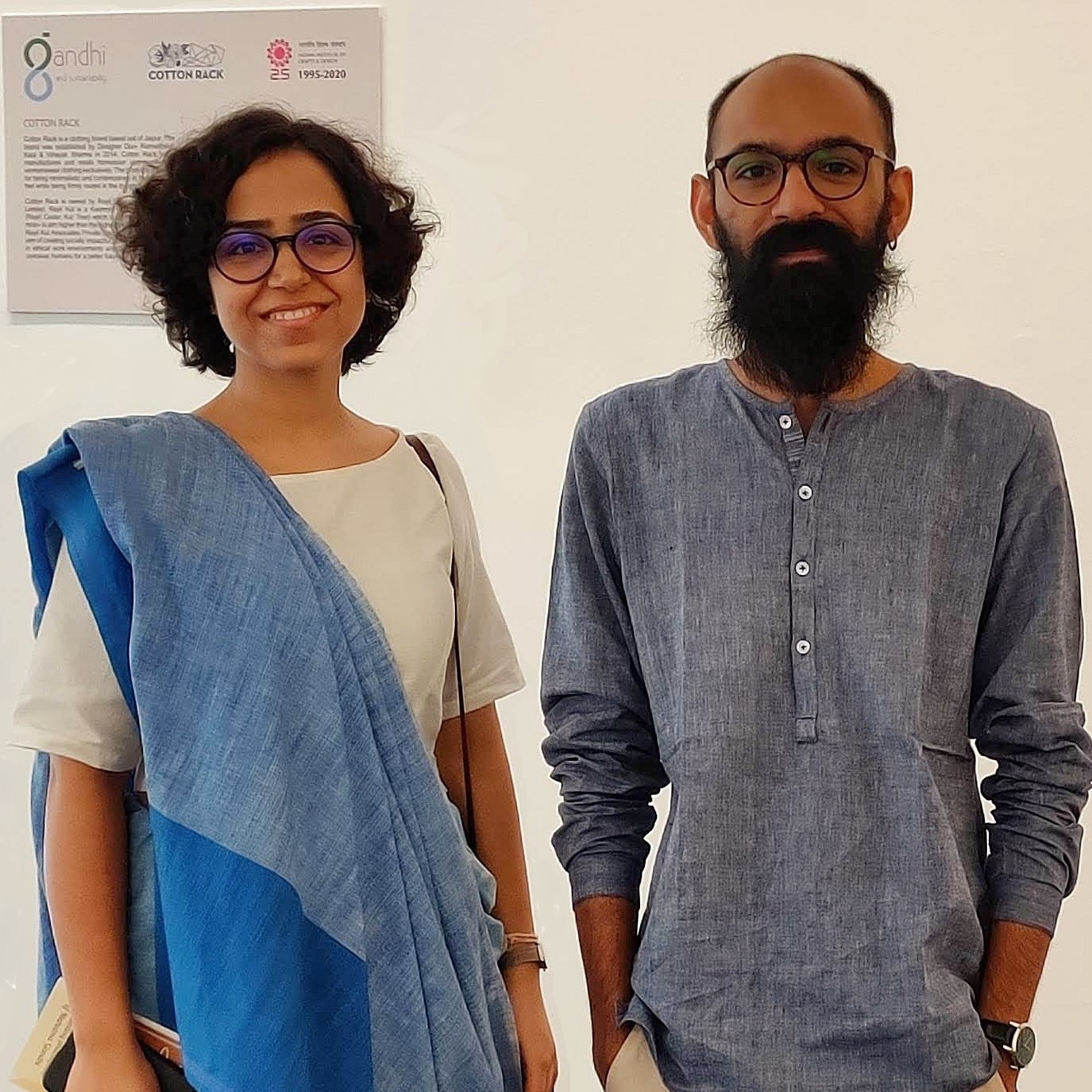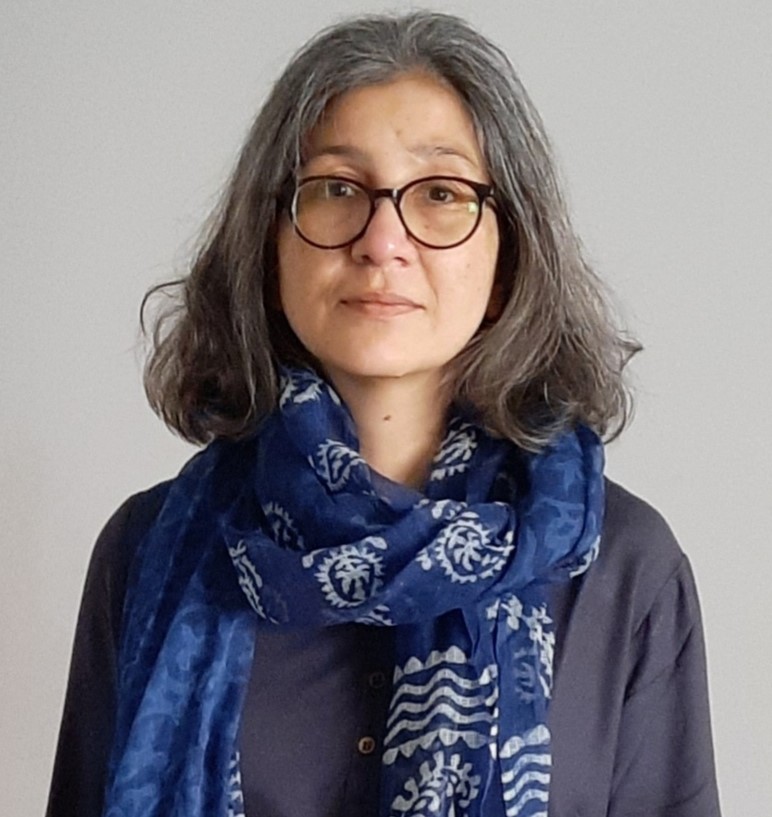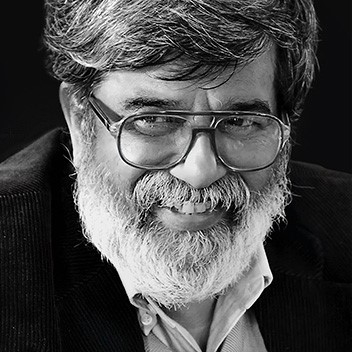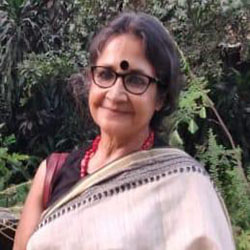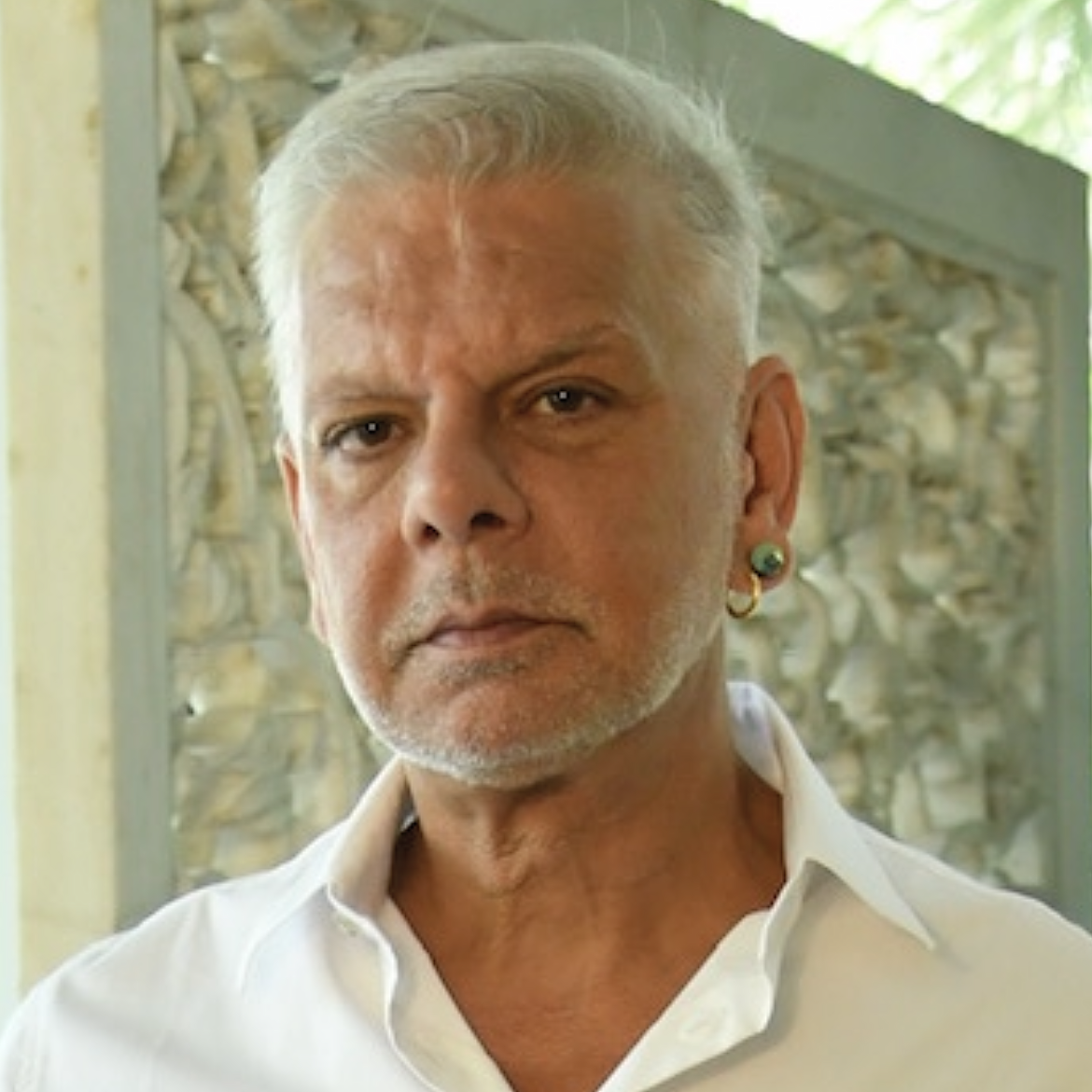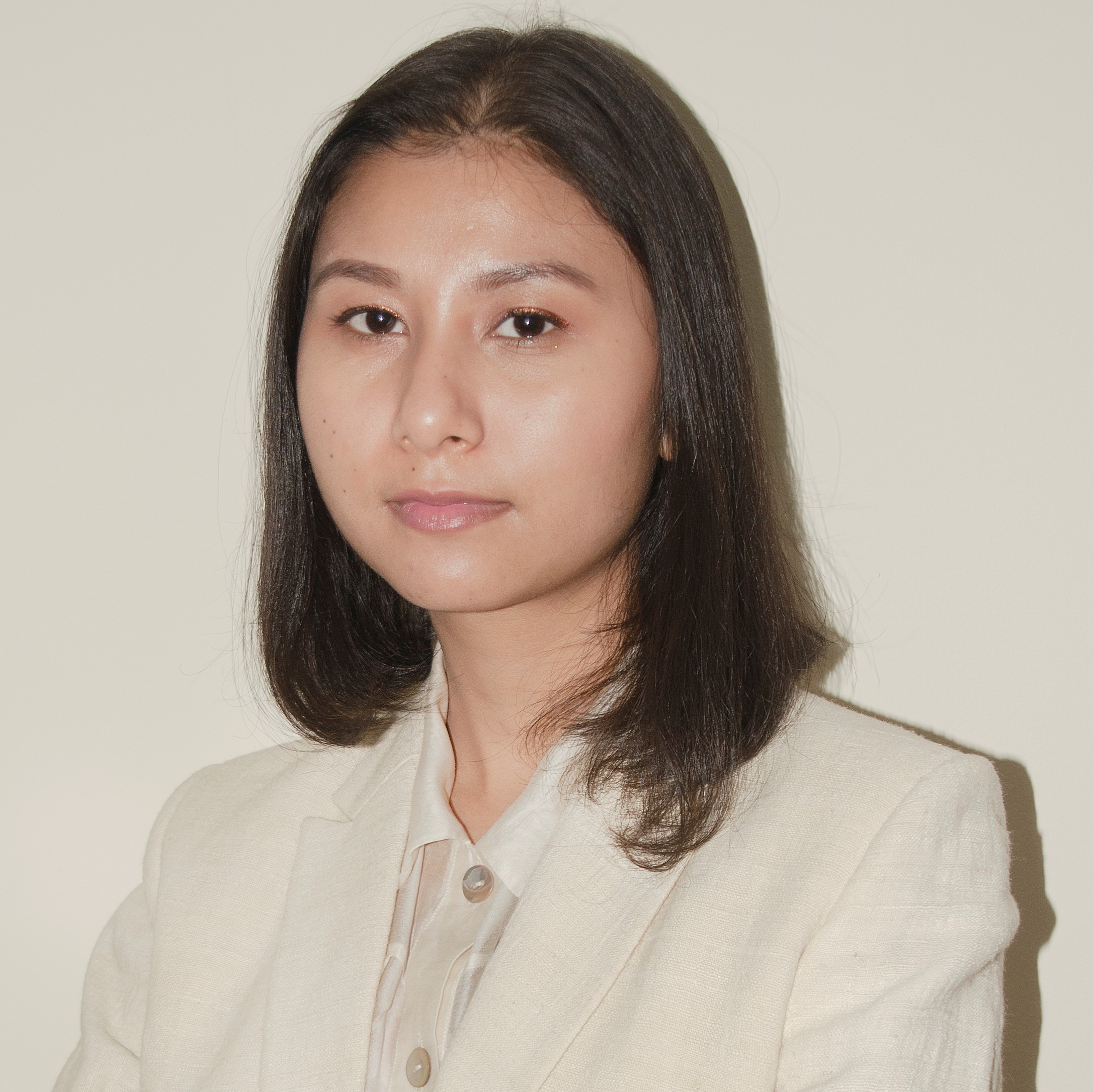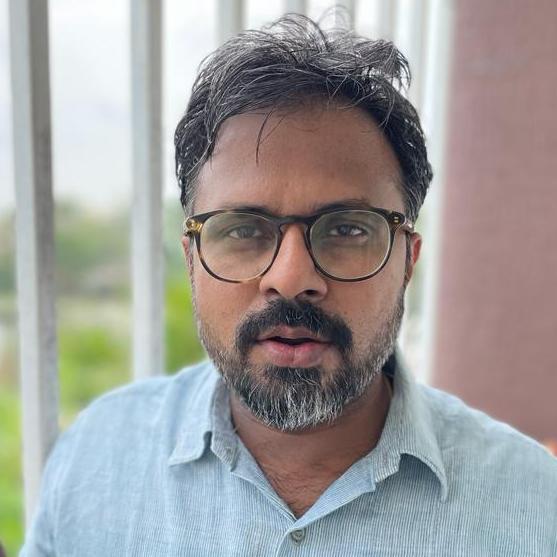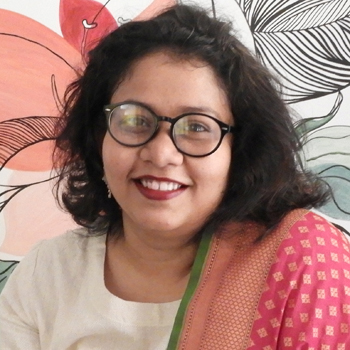JOURNAL ARCHIVE
Rameshwari Kaul and Vinayak Sharma,
Cotton Rack is a Jaipur based conscious clothing brand with its roots in natural handspun and handwoven textiles. Started in 2014 by Rameshwari Kaul & Vinayak Sharma to address the gap for minimalist clothing in natural fabrics, Cotton Rack successfully uses over 10 different varieties across cottons, silk & wool that is woven in Rajasthan, West Bengal and Jammu & Kashmir. Their work in textiles landed them as a finalist in Lexus Design Awards and continues to progress with their ongoing effort in working on indigenous wool. Vinayak Sharma: After graduating from NIFT, Delhi, Vinayak worked with a leading menswear brand for starting a new brand vertical. In 2014 he co-founded Cotton Rack to address the lack of a responsible & ethical clothing brand and has been the brains behind the brand identity, market outreach, fundraising and communication design. Rameshwari Kaul: Having worked with organizations like KVIC, Directorate of Textiles and a major Indian ethnic brand for creating handcrafted products Rameshwari Kaul co-founded Cotton Rack to address the gap of minimalist designs in handcrafted textiles and has been the brawn behind product development & textile value chain design.
Cotton Rack is a Jaipur based conscious clothing brand with its roots in natural handspun and handwoven textiles. Started in 2014 by Rameshwari Kaul & Vinayak Sharma to address the gap for minimalist clothing in natural fabrics, Cotton Rack successfully uses over 10 different varieties across cottons, silk & wool that is woven in Rajasthan, West Bengal and Jammu & Kashmir. Their work in textiles landed them as a finalist in Lexus Design Awards and continues to progress with their ongoing effort in working on indigenous wool. Vinayak Sharma: After graduating from NIFT, Delhi, Vinayak worked with a leading menswear brand for starting a new brand vertical. In 2014 he co-founded Cotton Rack to address the lack of a responsible & ethical clothing brand and has been the brains behind the brand identity, market outreach, fundraising and communication design. Rameshwari Kaul: Having worked with organizations like KVIC, Directorate of Textiles and a major Indian ethnic brand for creating handcrafted products Rameshwari Kaul co-founded Cotton Rack to address the gap of minimalist designs in handcrafted textiles and has been the brawn behind product development & textile value chain design.
Rana, Anurag,
With over 25 years of experience in skill training and product development in the rural sector and among the marginalized sections of society, I set up Mon Ami foundation, an independent, not-for-profit Trust, registered in India, in 2015. We work closely with recipient communities across rural and urban India with support from corporates, domain experts, and service providers to ensure equal participation from all stakeholders for a sustainable future! Our projects are focused on sustainable livelihoods. I firmly believe in an integrated approach to product development, skills training, market access and eco-effective processes. The possibility of projects that will positively impact society is endless and the needs of these people are real. My recent projects involve training migrant women in the rural urban pockets around Delhi - NCR region; and in and around Terai regions in Uttarakhand and Uttar Pradesh to develop products from various wild grasses that are found in the region. All the projects are design led and the focus is to build a sustainable eco system towards market led product development. Moonj Grass development project in USN Dist. Uttarakhand involved working closely with the Tharu community women artisans, introducing them to modern designs and forms through multiple rounds of product development. They were given extensive market exposure with respect to modern designs, new colour palette and technical processes along with a comprehensive session on costing, market outreach, utility and product display. Another Moonj craft development project in Sitapur district, Uttar Pradesh was done to provide the women artisans with much-needed design intervention, scaling-up and market linkages. The artisans were taught the importance of quality and production-oriented work where replication of designs was explained and implemented over several months. With the intent to empower these women artisans and provide a structure that supports them economically, the Foundation creates a meaningful impact on their livelihood wherein they can continue practicing their traditional craft in a sustainable manner. Anurag Rana (M.DES) National Institute of Design, Ahmedabad.
With over 25 years of experience in skill training and product development in the rural sector and among the marginalized sections of society, I set up Mon Ami foundation, an independent, not-for-profit Trust, registered in India, in 2015. We work closely with recipient communities across rural and urban India with support from corporates, domain experts, and service providers to ensure equal participation from all stakeholders for a sustainable future! Our projects are focused on sustainable livelihoods. I firmly believe in an integrated approach to product development, skills training, market access and eco-effective processes. The possibility of projects that will positively impact society is endless and the needs of these people are real. My recent projects involve training migrant women in the rural urban pockets around Delhi - NCR region; and in and around Terai regions in Uttarakhand and Uttar Pradesh to develop products from various wild grasses that are found in the region. All the projects are design led and the focus is to build a sustainable eco system towards market led product development. Moonj Grass development project in USN Dist. Uttarakhand involved working closely with the Tharu community women artisans, introducing them to modern designs and forms through multiple rounds of product development. They were given extensive market exposure with respect to modern designs, new colour palette and technical processes along with a comprehensive session on costing, market outreach, utility and product display. Another Moonj craft development project in Sitapur district, Uttar Pradesh was done to provide the women artisans with much-needed design intervention, scaling-up and market linkages. The artisans were taught the importance of quality and production-oriented work where replication of designs was explained and implemented over several months. With the intent to empower these women artisans and provide a structure that supports them economically, the Foundation creates a meaningful impact on their livelihood wherein they can continue practicing their traditional craft in a sustainable manner. Anurag Rana (M.DES) National Institute of Design, Ahmedabad.
Ranjan, M P,
Late MP Ranjan joined NID as a design student in 1969 in the PG programme in Furniture Design. As a member of the faculty at NID since 1976, MP Ranjan was responsible for creating and conducting numerous courses dealing with Design Theory and Methodology, Product and Furniture Design and numerous domains of Digital Design. He conducted research in many areas of Design Pedagogy, Industrial and Craft Design and on the role of design policy in various sectors of the Indian economy. He was on the NID Governing Council occupying the faculty representative seat on the Council. As a professional designer and design strategist he handled many design projects for industry, government and international agencies in areas of product design, interior design, exhibition design, craft design and design policy. He was an advisor to many State and Central Government Ministries in formulating strategies for the future use of bamboo and design for development. He helped redefine the Bamboo and Cane Development Institute, Agartala and set up the programmes to establish the new format.
Late MP Ranjan joined NID as a design student in 1969 in the PG programme in Furniture Design. As a member of the faculty at NID since 1976, MP Ranjan was responsible for creating and conducting numerous courses dealing with Design Theory and Methodology, Product and Furniture Design and numerous domains of Digital Design. He conducted research in many areas of Design Pedagogy, Industrial and Craft Design and on the role of design policy in various sectors of the Indian economy. He was on the NID Governing Council occupying the faculty representative seat on the Council. As a professional designer and design strategist he handled many design projects for industry, government and international agencies in areas of product design, interior design, exhibition design, craft design and design policy. He was an advisor to many State and Central Government Ministries in formulating strategies for the future use of bamboo and design for development. He helped redefine the Bamboo and Cane Development Institute, Agartala and set up the programmes to establish the new format.
Rao, Geetha,
Geetha Rao is Honorary Secretary of the Crafts Council of Karnataka and the head of Arts Umbrella an organization that provides professional management and consulting services in the arts and cultural sectors. . She writes regularly on craft related subjects for the Deccan Herald and other publications and has done the research and text for the Crafts Map of Karnataka, part of the Dastakari Haat Samiti series. Geetha Rao works on the revival and promotion of the crafts of Karnataka - Mysore Chada Ganjifa, Bhuta Masks, Kinhal Woodcraft and others. She conceived and curated the exhibition "Pakshi - Birds in Crafts of South India" in collaboration with India's leading jeweler, Ganjam and organized "Kamala - Festival of Indian Crafts" organized by the Crafts Council of India.
Geetha Rao is Honorary Secretary of the Crafts Council of Karnataka and the head of Arts Umbrella an organization that provides professional management and consulting services in the arts and cultural sectors. . She writes regularly on craft related subjects for the Deccan Herald and other publications and has done the research and text for the Crafts Map of Karnataka, part of the Dastakari Haat Samiti series. Geetha Rao works on the revival and promotion of the crafts of Karnataka - Mysore Chada Ganjifa, Bhuta Masks, Kinhal Woodcraft and others. She conceived and curated the exhibition "Pakshi - Birds in Crafts of South India" in collaboration with India's leading jeweler, Ganjam and organized "Kamala - Festival of Indian Crafts" organized by the Crafts Council of India.
Ratnakar, Pooja,
Pooja Ratnakar is an economics graduate who then went on to study design at NIFT, N. Delhi. She and her sister Payal Nath have been active in the craft clusters of Orissa and West Bengal, through their NGO Kadam and their marketing platform Art Bunker. Their efforts have been to connect traditional village and tribal crafts to everyday use in urban homes and offices. Their brand ‘Potli’ creates products that educate children on Indian art and craft traditions. Pooja writes for various magazines about her travel and experiences with people, places and art/craft.
Pooja Ratnakar is an economics graduate who then went on to study design at NIFT, N. Delhi. She and her sister Payal Nath have been active in the craft clusters of Orissa and West Bengal, through their NGO Kadam and their marketing platform Art Bunker. Their efforts have been to connect traditional village and tribal crafts to everyday use in urban homes and offices. Their brand ‘Potli’ creates products that educate children on Indian art and craft traditions. Pooja writes for various magazines about her travel and experiences with people, places and art/craft.
Ravi, Sumana,
Sumana Ravi graduated in Photojournalism from Light & Life Academy, Ooty. An ex- Management Consultant, she has worked on several projects to document the diverse facets of Indian culture covering events, people and places. For her, photography is both a passion and a mechanism for documenting stories of her profession.
Sumana Ravi graduated in Photojournalism from Light & Life Academy, Ooty. An ex- Management Consultant, she has worked on several projects to document the diverse facets of Indian culture covering events, people and places. For her, photography is both a passion and a mechanism for documenting stories of her profession.
Rawat, Bhawana,
Bhawana Rawat after completing her Master’s in Clothing and Textile from Govind Ballabh Pant University of Agriculture & Technology, Pantnagar, and Uttaranchal, Bhawana is working as an Assistant Professor in the Knitwear Design Department, National Institute Fashion Technology, Mumbai.
Bhawana Rawat after completing her Master’s in Clothing and Textile from Govind Ballabh Pant University of Agriculture & Technology, Pantnagar, and Uttaranchal, Bhawana is working as an Assistant Professor in the Knitwear Design Department, National Institute Fashion Technology, Mumbai.
Rawat, Shivaa,
Shivaa Rawat is working as a Research Associate on the UNESCO led Indian Heritage Cities Network (IHCN) program. Prior to this, she had assisted in the preparation of the second issue of the Power of Creativity Magazine, which focused on the Parsi community. She holds a Masters in Modern Indian History and a PG Diploma in Conflict Transformation in Peace Building from the University of Delhi.
Shivaa Rawat is working as a Research Associate on the UNESCO led Indian Heritage Cities Network (IHCN) program. Prior to this, she had assisted in the preparation of the second issue of the Power of Creativity Magazine, which focused on the Parsi community. She holds a Masters in Modern Indian History and a PG Diploma in Conflict Transformation in Peace Building from the University of Delhi.
Report by British Council Crafting Futures Argentina, Craft Revival Trust, India and REDIT, Argentina,
Authors: Rachel Kelly, Sol Marinucci, Ritu Sethi, Valeria Zamparolo, María Lombana - FAU - UNT, Alejandra Mizrahi - FAU - UNT, Florencia Elena Antonini - IDI - UNNOBA, Beatriz Martínez - FAUD - UNMdP, Patricia Pieragostini FADU - UNL, Moriana Abraham - FAUD - UNC, Mariela Favero - FAUD - UNMdP, Maria Blanca Iturralde - FAyD - UNaM, Maria Alejandra Moreno FAUD UNSJ.
Authors: Rachel Kelly, Sol Marinucci, Ritu Sethi, Valeria Zamparolo, María Lombana - FAU - UNT, Alejandra Mizrahi - FAU - UNT, Florencia Elena Antonini - IDI - UNNOBA, Beatriz Martínez - FAUD - UNMdP, Patricia Pieragostini FADU - UNL, Moriana Abraham - FAUD - UNC, Mariela Favero - FAUD - UNMdP, Maria Blanca Iturralde - FAyD - UNaM, Maria Alejandra Moreno FAUD UNSJ.
Rothstein, Scott,
Scott Rothstein is an artist who writes primarily about self-taught art and artists informed by traditional culture. His own work can been seen in several American museums, including the Art Institute of Chicago; the Metropolitan Museum of Art, NYC; the Museum of Fine Arts, Boston; and the Philadelphia Museum of Art. Rothstein has lived in Philadelphia, New York City, Bangkok, New Delhi, and Tokyo. He is currently based in New Mexico.
Scott Rothstein is an artist who writes primarily about self-taught art and artists informed by traditional culture. His own work can been seen in several American museums, including the Art Institute of Chicago; the Metropolitan Museum of Art, NYC; the Museum of Fine Arts, Boston; and the Philadelphia Museum of Art. Rothstein has lived in Philadelphia, New York City, Bangkok, New Delhi, and Tokyo. He is currently based in New Mexico.
Roy, Purabi,
Purabi Roy, a retired teacher works in the service and promotion of crafts and craftspeople. She is an Executive Board Member of Crafts Council of West Bengal (CCWB) since 2007 and the Coordinator for West Bengal of
EtoS (Education to Sustain) – a program of education of children of Artisans of the Crafts Council of India,
Sadr, Ayeshe,
Ayeshe Sadr is a design student at Srishti, Bangalore. She plans on becoming a Textile Designer and is on a year long sabbatical during which she has worked with Craft Council of India and Craft Revival Trust.
Ayeshe Sadr is a design student at Srishti, Bangalore. She plans on becoming a Textile Designer and is on a year long sabbatical during which she has worked with Craft Council of India and Craft Revival Trust.
Sagar, Hemant,
Hemant Sagar is a renowned fashion designer and co-founder of the Indo-French fashion house Lecoanet Hemant. Born in New Delhi to a German mother and an Indian father, Hemant spent his childhood in India. He pursued his passion for design and dressmaking and embarked on a successful career in the fashion industry. With a strong foundation in couture from the Ecole de la Chambre Syndicale de Couture Parisienne in Paris, Hemant's work reflects a unique blend of Indian and French aesthetics. The co-founder of Lecoanet Hemant, an Indo French fashion house established in the early 80s. As a creative force behind the parent brand and its other labels, including 'Genes,' a contemporary fashion brand catering to urban style seekers. Hemant has been the recipient of many highly respected awards including the Golden Thimble known as Le Dé d'or (the top accolade for Haute Couture which equates to the Oscar equivalent in the Couture world). They also received the Swarovski Creation prize in 2005 and the Designer of the year award in 2007 in Miami. Their work is also exhibited in several permanent international collections including the Victoria and Albert Museum in London and the Musée des Arts de la Mode, Paris. Hemant’s life changed when he moved to Germany at the age of fifteen, confronted with notions of ecology and sustainability unknown to him until then. This discovery led to the ecological collections in the 90s and its importance became evident in the establishment of 'Ayurganic,' a brand wholly dedicated to sustainable practices. By incorporating eco-friendly materials and ethical production methods, he has successfully brought awareness to the importance of environmentally conscious fashion. The Ramie Project is a natural continuation of the thought procedure.
Hemant Sagar is a renowned fashion designer and co-founder of the Indo-French fashion house Lecoanet Hemant. Born in New Delhi to a German mother and an Indian father, Hemant spent his childhood in India. He pursued his passion for design and dressmaking and embarked on a successful career in the fashion industry. With a strong foundation in couture from the Ecole de la Chambre Syndicale de Couture Parisienne in Paris, Hemant's work reflects a unique blend of Indian and French aesthetics. The co-founder of Lecoanet Hemant, an Indo French fashion house established in the early 80s. As a creative force behind the parent brand and its other labels, including 'Genes,' a contemporary fashion brand catering to urban style seekers. Hemant has been the recipient of many highly respected awards including the Golden Thimble known as Le Dé d'or (the top accolade for Haute Couture which equates to the Oscar equivalent in the Couture world). They also received the Swarovski Creation prize in 2005 and the Designer of the year award in 2007 in Miami. Their work is also exhibited in several permanent international collections including the Victoria and Albert Museum in London and the Musée des Arts de la Mode, Paris. Hemant’s life changed when he moved to Germany at the age of fifteen, confronted with notions of ecology and sustainability unknown to him until then. This discovery led to the ecological collections in the 90s and its importance became evident in the establishment of 'Ayurganic,' a brand wholly dedicated to sustainable practices. By incorporating eco-friendly materials and ethical production methods, he has successfully brought awareness to the importance of environmentally conscious fashion. The Ramie Project is a natural continuation of the thought procedure.
Saikia, Manjushree,
Manjushree Saikia, originating from the upper valleys of Assam, developed a strong affinity for Assam Textiles and folk cultures during her upbringing. Her intrigue for cultures and craftsmanship led her to textiles and eventually the world of fashion. Graduating from the National Institute of Fashion Technology (NIFT) as a Textile Designer in 2016, Manjushree began her journey by exploring various craft clusters across India. Engaging with organic dye, hand spinning, and hand weaving groups, she was deeply impressed not only by their skill but also by their humility and values. This experience ignited her awareness of a designer's responsibility towards Indian artisans and society. In 2018, she founded Ura Maku, a conscious clothing line aimed at giving a fresh design perspective to her native textiles. Through Ura Maku, she achieved recognition such as the Grazia Young Fashion Award for Urbanwear. She collaborates with textiles enthusiasts and delivers guest lectures at fashion colleges, often alongside Ura Maku.
Manjushree Saikia, originating from the upper valleys of Assam, developed a strong affinity for Assam Textiles and folk cultures during her upbringing. Her intrigue for cultures and craftsmanship led her to textiles and eventually the world of fashion. Graduating from the National Institute of Fashion Technology (NIFT) as a Textile Designer in 2016, Manjushree began her journey by exploring various craft clusters across India. Engaging with organic dye, hand spinning, and hand weaving groups, she was deeply impressed not only by their skill but also by their humility and values. This experience ignited her awareness of a designer's responsibility towards Indian artisans and society. In 2018, she founded Ura Maku, a conscious clothing line aimed at giving a fresh design perspective to her native textiles. Through Ura Maku, she achieved recognition such as the Grazia Young Fashion Award for Urbanwear. She collaborates with textiles enthusiasts and delivers guest lectures at fashion colleges, often alongside Ura Maku.
Sanyal, Amba,
Amba Sanyal studied at the College of Art (New Delhi) and the Beaux Arts (France). She coordinated the documentation project 'Saris of India' under the Development Commission (Handlooms) and co-authored 'Saris of India - Madhya Pradesh'. Since the 60s Amba has worked with rural communities in craft development and design intervention as well as art education with village school children. At present she works as a costume designer for film and theatre and teaches costume design. She works extensively with school and college students running theatre and art appreciation workshops.
Amba Sanyal studied at the College of Art (New Delhi) and the Beaux Arts (France). She coordinated the documentation project 'Saris of India' under the Development Commission (Handlooms) and co-authored 'Saris of India - Madhya Pradesh'. Since the 60s Amba has worked with rural communities in craft development and design intervention as well as art education with village school children. At present she works as a costume designer for film and theatre and teaches costume design. She works extensively with school and college students running theatre and art appreciation workshops.
Satish, Poludas Nagendra,
Founder and Principal Designer, KORA Design Collaborative, Hyderabad. A Print maker, a Design Graduate from NID, Ahmedabad. Satish has an extensive background and expertise working with the textile and craft sectors in the states of Andhra Pradesh, Telangana, Kerala, Jharkhand, Bengal, Orissa and Bihar. KORA Design Collaborative is a design and research practice initiated by a small group of designers, technicians and master crafts persons. Satish leads KORA. KORA’s work is a practical application of the principals of ecology, which sees people as crucial to any successful environmental projects. The work mainly focuses on understanding available natural resources, developing local skills and setting up of decentralized, least "capital-energy" requiring systems that would create sustainable livelihood to hundreds of people. In the process one try to emphasize and establish deep ecological, cultural and historical links between people and the eco- systems.
Founder and Principal Designer, KORA Design Collaborative, Hyderabad. A Print maker, a Design Graduate from NID, Ahmedabad. Satish has an extensive background and expertise working with the textile and craft sectors in the states of Andhra Pradesh, Telangana, Kerala, Jharkhand, Bengal, Orissa and Bihar. KORA Design Collaborative is a design and research practice initiated by a small group of designers, technicians and master crafts persons. Satish leads KORA. KORA’s work is a practical application of the principals of ecology, which sees people as crucial to any successful environmental projects. The work mainly focuses on understanding available natural resources, developing local skills and setting up of decentralized, least "capital-energy" requiring systems that would create sustainable livelihood to hundreds of people. In the process one try to emphasize and establish deep ecological, cultural and historical links between people and the eco- systems.
Scott, Victoria,
Victoria Scott was born in Bluffton, Indiana in 1943, and graduated from Bluffton High School like her mother before her. She was deeply interested in art from an early age. In 1965, she graduated in art history from Smith College where her interest focused on African art. She was profoundly influenced by the trilogy of books on the subject by anthropologist/philosopher Robert Plant Armstrong and she went to Dallas to study with him. Shortly thereafter he contracted cancer and passed away - a tragic event that was deeply disturbing and disorienting. The scant literature on African art in those days focused on wood sculpture, always with the caveat that colonialism and "development" degraded and distorted the tradition. Victoria refused to believe that Africa no longer produced art; she was correct. She spent the 1970s in Nigeria, and in Osogbo, a Yoruba town 80 miles north of Lagos, she found a unique "folk art" which was at its most vibrant during this time. She collected Osogbo art and documented the emerging of post-colonial culture. In 1980, Victoria returned to the U.S. where she raised her two children and continued to promote the work and careers of Osogbo artists. In 1990, she relocated from New York to Santa Fe. She returns to West Africa periodically to collect art and textiles. Currently she is putting work online to sell and tell the story of modern Nigerian "folk art."
Victoria Scott was born in Bluffton, Indiana in 1943, and graduated from Bluffton High School like her mother before her. She was deeply interested in art from an early age. In 1965, she graduated in art history from Smith College where her interest focused on African art. She was profoundly influenced by the trilogy of books on the subject by anthropologist/philosopher Robert Plant Armstrong and she went to Dallas to study with him. Shortly thereafter he contracted cancer and passed away - a tragic event that was deeply disturbing and disorienting. The scant literature on African art in those days focused on wood sculpture, always with the caveat that colonialism and "development" degraded and distorted the tradition. Victoria refused to believe that Africa no longer produced art; she was correct. She spent the 1970s in Nigeria, and in Osogbo, a Yoruba town 80 miles north of Lagos, she found a unique "folk art" which was at its most vibrant during this time. She collected Osogbo art and documented the emerging of post-colonial culture. In 1980, Victoria returned to the U.S. where she raised her two children and continued to promote the work and careers of Osogbo artists. In 1990, she relocated from New York to Santa Fe. She returns to West Africa periodically to collect art and textiles. Currently she is putting work online to sell and tell the story of modern Nigerian "folk art."
Sekh, Tanjima Kar,
Tanjima Kar Sekh is an art, history and culture enthusiast, holds a Master’s degree in Art History from National Museum Institute. She is an artist inspired by traditional artistic practices. She worked as a part-time Assistant Professor at the College of Art, Delhi. Currently, she is a research scholar at the Department of History & Culture, Jamia Millia Islamia.
Tanjima Kar Sekh is an art, history and culture enthusiast, holds a Master’s degree in Art History from National Museum Institute. She is an artist inspired by traditional artistic practices. She worked as a part-time Assistant Professor at the College of Art, Delhi. Currently, she is a research scholar at the Department of History & Culture, Jamia Millia Islamia.
